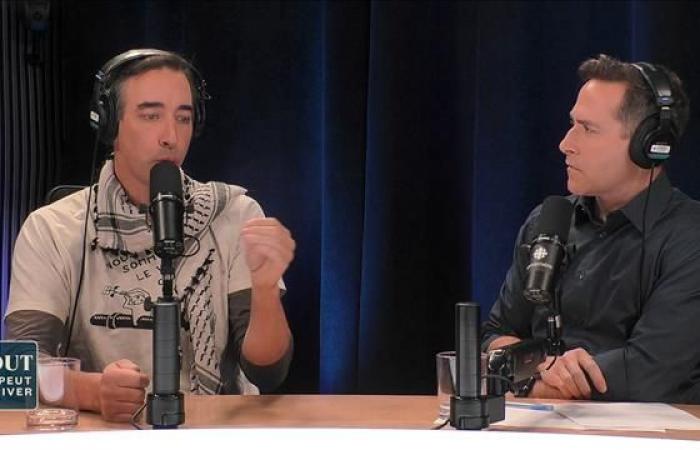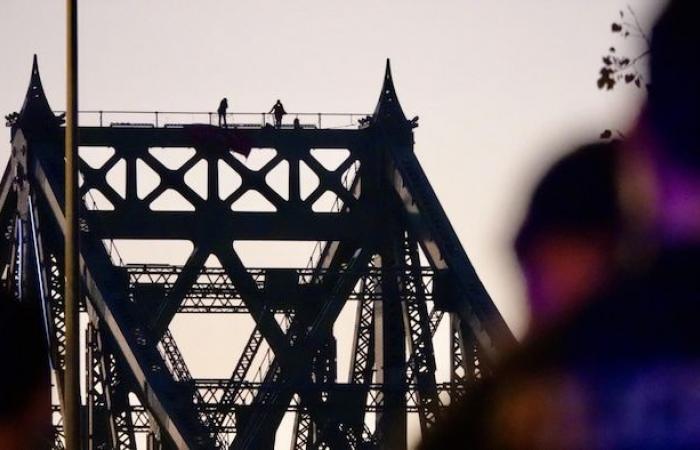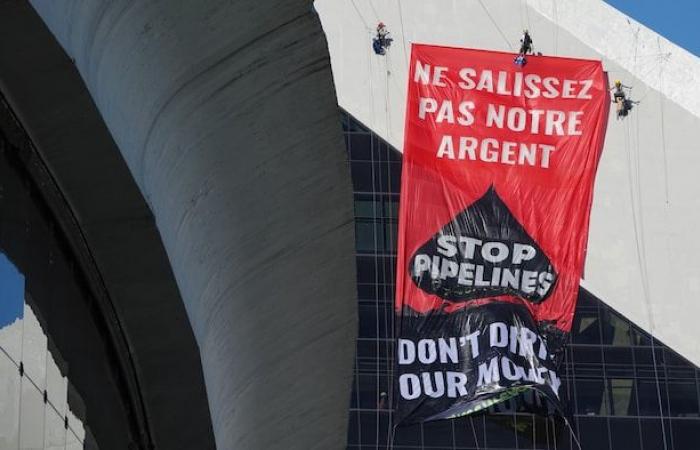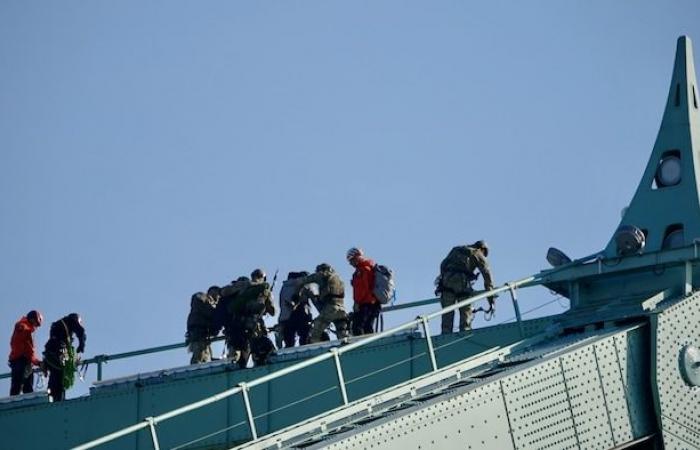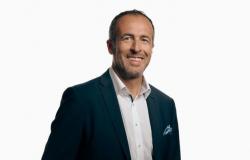Environmental activist Olivier Huard, who climbed on the structure of the Jacques-Cartier Bridge and blocked traffic on October 22 in Montreal, justified his actions on Saturday on the show Anything can happen on ICI Première.
Since the previous actions of his collective Antigone had not attracted sufficient media attention, we said to ourselves: “We have to do something”
he explained on Marie-Louise Arsenault’s microphone.
We felt obliged by the situation to provoke a debate
becausewe don’t feel listened to
.
It was a symbolic action with the aim of provoking debate.
In 2022, he and around ten other demonstrators occupied the Valero oil terminal for 24 hours in eastern Montreal.
We didn’t block any traffic and we had very little media coverage
he said about this action which aimed to alert the population about the risks linked to the Enbridge 9B pipeline which supplies the Valero company.
About twenty days ago, perched for six hours on the highest point of the bridge with another activist, Olivier Huard gave interviews to several morning shows in the Montreal region to denounce the inaction of the authorities.
Open in full screen mode
The demonstrators sat for six hours at the top of the Jacques-Cartier Bridge.
Photo : - / Simon-Marc Charron
This 47-year-old activist stressed that governments are unable to stem the climate crisis
et are incapable of effectively protecting us against the effects
of this crisis.
Five years after environmental activists climbed the Jacques-Cartier Bridge for the first time, the Antigone collective, of which Olivier Huard is a member, wanted to mark the occasion, inspired in particular by the forest fires which ravaged the town of Jasper, the last summer in Alberta.
The blocking of traffic from the early hours of the morning had caused a commotion on the roads. During Mr. Huard’s conditional release on October 31, the lawyer for the Director of Criminal and Penal Prosecutions (DPCP) emphasized that many people missed medical appointments [et] treatments for cancer
.
We’re really sorry, we didn’t mean to do that
apologized the one who ran as a candidate five times for Québec solidaire.
When things are unfair, you have to be able to step outside the box to broaden the debate
he justified, we are ready to put ourselves at risk because the situation requires it
.
First environmentalists imprisoned
A career industrial climber, Olivier Huard has taken part in several similar actions in the past. Before chaining himself to an oil loading structure at the Valero terminal, he climbed the mast of the Olympic Stadium in 2018 and barricaded himself in gondolas of the Val-Jalbert cable car, among others.
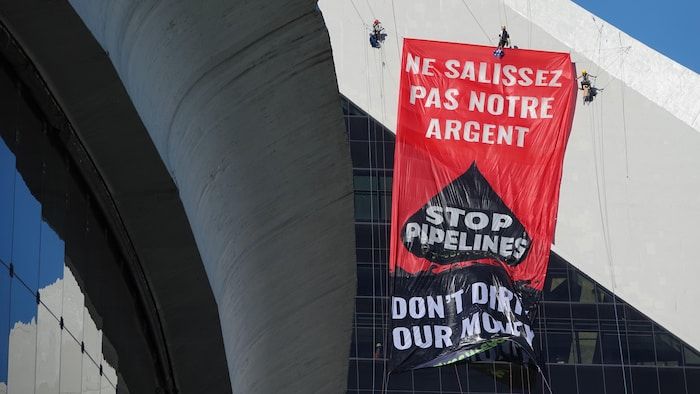
Open in full screen mode
Activists from the Greenpeace organization displayed a banner on July 19, 2018 along the mast of the Olympic stadium in Montreal, after having climbed it.
Photo : - / Alexandre Letendre
Back on the ground, Mr. Huard and the other climber, Jacob Pirro, were arrested and then charged with mischief and obstruction. The activist who liaised with the police, Michèle Lavoie, was also accused of mischief.
Olivier Huard was not surprised by these accusations: This is the principle of civil disobedience
. But contrary to what he had previously experienced, he remained imprisoned for several days, in order to preserve public confidence in the justice system, according to the DPCP.
It was the first time in the history of Quebec that environmentalists were sent to prison.
Mr. Pirro and Ms. Lavoie were released on conditions not to speak to the media and not to contact each other, but Olivier Huard refused to comply with these demands.
The president of the Professional Federation of Journalists of Quebec (FPJQ), Éric-Pierre Champagne, also criticized this condition.
He was detained for nine days in an overcrowded prison
and in conditions atroces
where he began a hunger strike to defend his right to express himself in the media. It was the only way I had to express myself
he said.
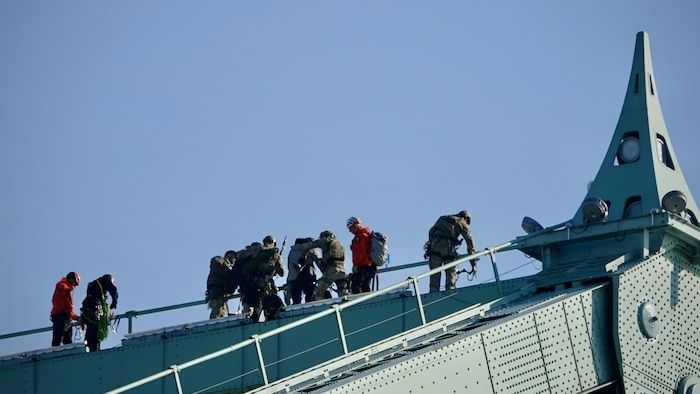
Open in full screen mode
The two climbers were charged with mischief and obstruction.
Photo : - / Simon-Marc Charron
The condition was not to make direct or indirect reference to the present accusations on any media whatsoever, including social media.
specified the DPCP by email.
The objective of the condition was to allow Mr. Huard to share his messages relating to the environment if he wishes, but ensuring that he would not encourage others to commit such actions as blocking bridges.
On the day of his release, the judge said that he was sorry for what happened and that I should never have gone to jail
recalled Olivier Huard, recalling the abject conditions in which he lived at the Rivière-des-Prairies detention facility.
By email, the Ministry of Public Security responded that it strives to offer the best possible detention conditions
refusing to comment on Mr. Huard’s case.

